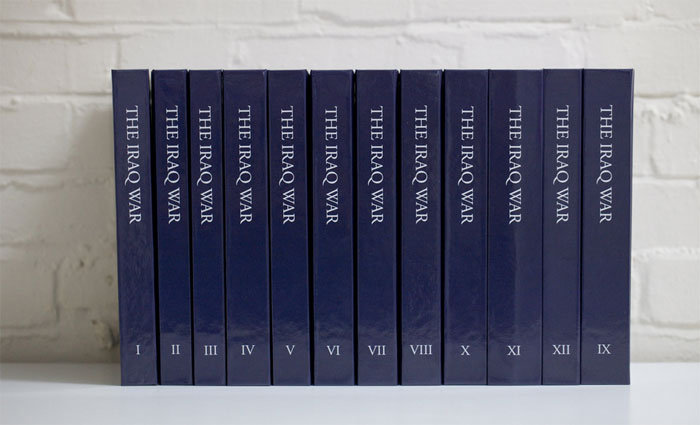James Bridle has just constructed a twelve-volume history of the Iraq War. But this is no common history. It is a record of every edit made to the Wikipedia entry on the war from December 2004 to November 2009. The 12,000 changes take up 7,000 pages.
Bridle, a British writer and editor, is best known for his observations about books and technology. He produced these volumes to illustrate that history is not fact, but
 rather a process. History, he claims, is less important than “historiography,” which he redefines as the process by which humans come to understand an event. According to Bridle, culture is argument, dissent, and gradual codification of a narrative that may or may not be correct.
rather a process. History, he claims, is less important than “historiography,” which he redefines as the process by which humans come to understand an event. According to Bridle, culture is argument, dissent, and gradual codification of a narrative that may or may not be correct.By illuminating every single voice in the history of a particular moment, Bridle wants readers to see how that process works. His goal, he concludes, is “to challenge absolutist narratives of the past, and thus, those of the present and our future.”
This set of volumes strikes me as a fascinating document for future scholars of the Iraq War, who will be able to watch ideas about the war change over time.
But it can not replace scholarly history.
Bridle’s claim that the process of cultural construction of understanding is more important than what actually happens illustrates a dangerous trend in our interpretation of human society. It forces the insights of deconstruction to carry far more weight than they are strong enough to bear.
The deconstruction movement was invaluable for historians, teaching us to question the biases inherent in narratives. But the fact that all narratives are biased is no reason to discard the idea that it is possible to come close to a factual account of historical events.
To argue otherwise is to claim that the comment of one Wikipedia user—“Saddam Hussein was a dickhead”—is as important as Colin Powell’s February 2003 speech before the United Nations Security Council advocating military force against the Iraq regime.
If these two voices are equally valuable in the history of the war, it’s hard not to argue that each lone voice is equally valuable in current affairs. This is the ultimate in deconstructionism—that a lifetime spent studying the Middle East is no more valuable for devising foreign policy than a gut sense; that an understanding of the rules of Congress is less important than a knee-jerk demonization of a political opponent; that actual facts can be discarded in favor of comfortable fiction.
The work of constructing fictional worlds belongs to novelists, and it is a rich world where each facet of human relations can be probed and prodded all the way to the extremes of behavior. But historians study the way real human societies work. To do that, while we must always try to look at all the different voices we can discern in the muddle that is our evidence, we must also try our best to find the actual facts that drive historical change.







